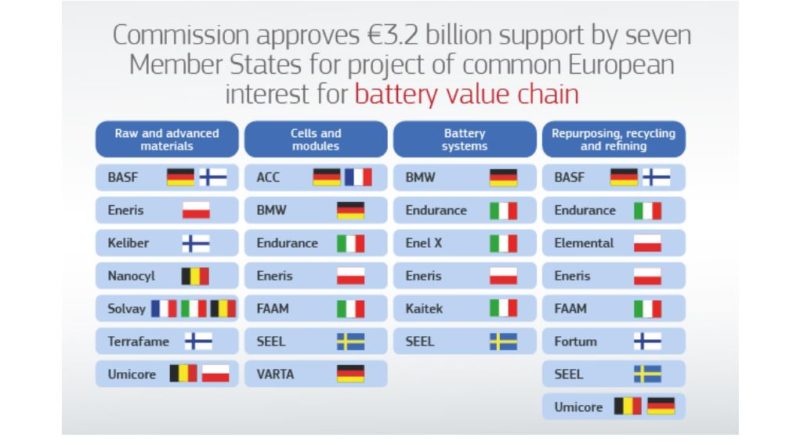European Commission reveals €3.2 Bn fund to develop battery technology
Those developing and producing battery technology in Europe are to be given access to a new €3.2 billion fund from the European Commission.
Approved as part of the Important Project of Common European Interest state aid funding, the cash is part of a number of initiatives to position Europe at the forefront of a green vehicle revolution, with electrified transport set to be a key beneficiary from the project.
Margrethe Vestager, Executive Vice-President Europe fit for the Digital Age and Commissioner in charge of competition policy, said: “Battery production in Europe is of strategic interest for our economy and society because of its potential in terms of clean mobility and energy, job creation, sustainability and competitiveness. Our Important Projects of Common European Interest smooth the way for public authorities and industries from several Member States to come together and design ambitious innovation projects with positive spill-over effects across industrial sectors and regions. The approved aid will ensure that this important project can go ahead without unduly distorting competition.”
To qualify for the funding, participants have had to meet the following criteria:
A project must, in particular: (i) contribute to strategic EU objectives; (ii) involve several Member States; (iii) involve private financing by the beneficiaries, (iv) generate positive spillover effects across the EU, and (v) be highly ambitious in terms of research and innovation, i.e. it has to go beyond what is widely regarded as the “state of the art” in the sector concerned.
At present, the funding is likely to be split between a select group of member states.
“More specifically, Belgium has sought approval to grant up to approximately €80 million; Finland up to approximately €30 million; France up to approximately €960 million; Germany up to approximately €1.25 billion; Italy up to approximately €570 million; Poland up to approximately €240 million and Sweden up to approximately €50 million”, according to the statement issued today.
As noted above, funding will in part have to be matched by the beneficiary company and it is hoped that the incentive could unlock up to €5 billion in private investment cash by the 2031 end.
Maroš Šefčovič, Vice-President for Interinstitutional Relations and Foresight, added: “Our focus on scaling up innovation under the European Battery Alliance is yielding strong industrial partnerships. Thanks to intensive efforts by seven Member States, industry and the Commission, Europe’s first major pan-European battery ecosystem is emerging, with lead projects in all segments of this strategic value chain. We have found the right recipe for our 21st century industrial policy: strong cooperation between industrial actors, concerted action to accelerate lab-to-market innovation, joined-up financial instruments from both, private and public sectors, and a fit-for-future regulatory framework to underpin a stronger European knowledge-based economy.”
The project will involve 17 direct participants, mostly industrial actors, including small and medium-sized enterprises (SMEs), some of which with activities in more than one member state. The direct participants will closely cooperate with each other and with over 70 external partners, such as SMEs and public research organisations across Europe.
Few on the list thus far are recognisable names to the bike industry, bar Solvay and BMW, but it is expected the tech trickledown will filter through to those supplying the cycle trade with battery technology on an OEM basis.
At the close of 2017 a European Battery Alliance was founded in a bid to create a hub for member states to benefit from research and development achieved in Europe.
With electric bicycle growth forecast to outnumber other forms of electric vehicle many-fold, it is expected that the funding will have a trickledown benefit for the bike industry.
Among the goals of the project it is hoped that a cleaner battery technology can be developed and one that charges faster and last longer. Progress on the fast charging front has already been made further afield.
The Commission seeks that beneficiaries focus on the following criteria as part of the pledge for support:
(1) Raw and advanced materials: The project aims to develop sustainable innovative processes allowing extraction, concentration, refining and purification of ores to generate high-purity raw materials. With respect to advanced materials (such as cathodes, anodes and electrolytes), the project aims to enhance existing materials or create new ones, to be used in innovative battery cells.
(2) Cells and modules: The project aims to develop innovative cells and modules designed to meet the safety, and performance required for both automotive and non-automotive applications (e.g. stationary energy storage, power tools, etc.).
(3) Battery systems: The project aims to develop innovative battery systems including battery management software and algorithms as well as innovative test methods.
(4) Repurposing, recycling and refining: The project aims to design safe and innovative processes for collection, dismantling, repurposing, recycling and refining of recycled materials.



